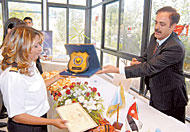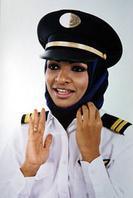First Saudi Female Pilot Graduates
Abdul Jalil Mustafa, Arab News

AMMAN, 16 June 2005 — The Kingdom’s first woman pilot, Hanadi Zakaria Al-Hindi, graduated yesterday from the Middle East Academy for Commercial Aviation in Jordan.
“It is a source of pride for us,” said Muhammad Audeh, chairman of the academy’s board of directors, at a graduation ceremony where she received her civil aviation license.
For her part, Al-Hindi expressed joy at graduating and said she would return to Saudi Arabia to work on a private plane owned by Prince Al-Waleed ibn Talal who paid the costs of her studies in Jordan.
Sultan Al-Owaideh, the cultural attache at the Saudi Embassy in Amman, expressed pride about the graduation of the first Saudi woman pilot.
“Capt. Hanadi has set an example for the Saudi woman,” he said.
The article was fair enough except for the picture. Now I am not one to judge, and I believe that to each his/her own, but I am pretty sure, judging from the conservative nature of most of the locals here, this picture will fuel some anger because she is shown, not only with her face uncovered but also her hair showing as well.
As it is progress for women is going at a very slow rate, women can now get some jobs, but they are highly competitive, and oppurtunities are limited. Limited in terms of the number of places they can get, as well as in terms of paternal and spousal permission.
I had encountered a little bit of this myself. At first I found it incredulous, almost unbelievable, but later I found out that it is actually the way of life here. Upon enrolling in an Arabic class in the local University, I was told by the teacher that I have to bring a letter of permission from my husband, allowing me to attend the class. HUH? The last time I had any sort of consent form was way back in school. Surely by now I am a grown woman who is capable for making decisions for myself.
But I soon found out that its just the way things work here. For example, a woman, if she wants to travel outside the country, has to produce a letter of permission from her male Muhrim stating that she is allowed to travel abroad. That letter is as important as her passport, without it, she would not be allowed to leave the country.
Which in turn brings me to the second article I found:
SAUDI ARABIA: CLERIC ISSUES FATWA AGAINST FEMALE PILOT

Riyadh, 29 June (AKI) - A Saudi cleric has issued a fatwa making it unlawful for any woman to work as a pilot. Sheikh Yousuf al-Ahmad issued the statement in response to a full-page advert Saudi billionaire Prince Waleed recently took out in several local papers, congratulating Captain Hanadi Zakaria on becoming the first Saudi woman to get a commercial pilot's licence. Waleed has employed Captain Zakaria to work for his company's fleet of private jets.
However, the adverts have angered religious and conservative figures in the country, the Emirates-based newspaper Gulf News reports. In his fatwa, Al-Ahmad, an associate professor of Sharia law at Imam Mohammad bin Saud University in Riyadh, said the job would require Zakaria to travel without a male guardian, and would therefore lead to women mixing with men, which he branded unacceptable.
His statement went on to say that the contract employing Zakaria is unlawful and women should never be allowed to work as either pilots or air hostesses. He also declared the adverts unlawful. Several internet sites run by conservative and extremist Islamic groups have criticised plans to let women pilot aircraft, and these statements have also prompted the cleric to issue his fatwa.
Women are not allowed to drive vehicles in Saudi Arabia, but 24-year-old Zakaria, who is said to be from a conservative family from the holy city of Mecca, obtained her pilot's commercial licence earlier this year, leading to a ten-year contract with the Kingdom Holding Company. She was due to start her job around now.
Prince Waleed - a nephew of the king - is a businessmen and political activist who has called for a range of reforms in the Kingdom, including greater rights for women and democratic elections.
Meanwhile, the debate over the ban on women driving, introduced in 1990, shows no sign of abating. Even though the Shuria consultative council has refused to hold a debate on the ban, 100 Saudi citizens, including 60 women, have signed a petition and submitted it to the National Human Rights Commission, calling for women to be allowed to drive. The Commission's vice-chairman says the petition has been referred to the commission's legal consultancy department, which will decide whether or not to take up the issue.
(Slb/Aki)
29-Jun-05 13:43
Funnily enough, the latter article was not from the local news. Perhaps just not in the English language ones anyways. But whether Captain Hanadi's achievement will have a real impact on the general masses, it remains to be seen, although I am hopeful that it will. Afterall, her studies was financed by the new employer, not many local women will have that oppurtunity.
But, more recently I have met some women in this society which to me signifies hope in the future. Women who are very well educated and who have good jobs. From talking to a few of them, I had some sense that they wanted to see some progress in terms of women's rights in this country, although they realize that the change would have to be gradual and from within.
The section of the society is changing, and it is only through education that we all can get progress. Bring brings me to Anasalwa's blog entry on July 7, out of 100 people on earth, only 1 would have a college education.
Will education be the only factor that will straddle the great divide between the elite and the masses?
Sadly enough, the results of the recent study was telling:
The research, conducted in 2003, surveyed an equal number of (1,092) Saudi men and women throughout the Kingdom. The age for men was between 21 and 85 and for women between 15 and 63, with most of the sample, 59 percent, in the 31 to 45 age bracket.
Although the education levels of the men and women were almost equal in elementary, intermediate and high school, 18.6 percent of the women surveyed were illiterate compared to five percent of the men, and 31.9 percent of the men had university degrees as opposed to only 15.8 percent of the women.
Can anyone point to me where I can find similar statistics for Malaysia?
1 comment:
do you overseas education consultants in hyderabad study abroad want to study in abroad today or in the next intake. we are the best and top rated study abroad consultancies in india with good visa assurance.we help you in filing the f1 visa for you in very less time. we are also help you with information needed to apply for the college university.
Post a Comment